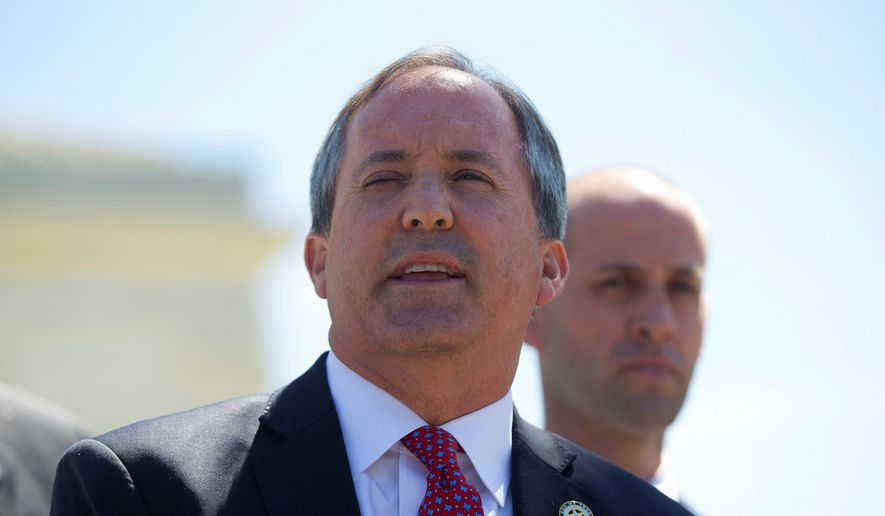Texas Attorney General Ken Paxton warned Thursday that he will sue the Trump administration to stop the deportation amnesty for Dreamers unless the government voluntarily phases out the program.
In a letter joined by nine other state attorneys general and the governor of Idaho, Mr. Paxton says the 2012 amnesty created by President Obama and continued by President Trump is illegal.
He set a Sept. 5 deadline for the government to announce a phaseout. Mr. Paxton said that if that doesn’t happen, he will ask a judge to end the program, known in governmentspeak as DACA.
“We request that the Secretary of Homeland Security rescind the June 15, 2012 DACA memorandum and order that the Executive Branch will not renew or issue any new DACA or Expanded DACA permits in the future,” the attorneys general said.
Their letter leaves Mr. Trump in a tricky political crossfire.
During the election campaign, Mr. Trump promised to cancel DACA, but he has since said he will keep it in place. That move drew some praise from immigrant rights advocates but angered his base of supporters, who say he is breaking a campaign pledge and embracing an illegal Obama program.
The 2012 amnesty grants work permits and a two-year stay of deportation to illegal immigrant young adults who came to the U.S. as children and who have kept relatively clean records.
More than 780,000 Dreamers have been approved for the program, including tens of thousands who have either been approved or had their permits renewed under Mr. Trump.
No court has ruled on the legality of DACA, but courts have found a broader program, dubbed DAPA, to be illegal. The judges said it’s up to Congress, not the president, to issue such a broad grant of tentative legal status to an entire category of people.
DAPA would have applied to as many as 4 million people, including a broader set of Dreamers and an entire category of illegal immigrant parents whose children are U.S. citizens or legal permanent residents.
The Trump administration this month officially revoked DAPA but specifically said it was keeping DACA in place.
That’s a curious move, legally.
DAPA parents have some argument for future legal status, because their legally present children can eventually file petitions for them, the Office of Legal Counsel said. DACA recipients do not necessarily have that connection to the U.S., however.
Mr. Paxton said DACA suffers from the legal problems that sank DAPA in the courts.
“Just like DAPA, DACA unilaterally confers eligibility for work authorization … and lawful presence without any statutory authorization from Congress,” he wrote.
The Justice Department did not immediately respond to a request for comment Thursday.
Immigrant rights groups were outraged by the calls to have DACA canceled.
“Make no mistake: We will organize and fight to defend, preserve and protect DACA,” said Greisa Martinez, advocacy director at United We Dream Action and a DACA beneficiary. “There is absolutely no reason why this country should put 800,000 young people, myself included, into the deportation pipeline. This is our home, and we are here to stay.”
Mr. Paxton said a phaseout would allow anyone who is currently approved for a two-year DACA grant to finish out that period, but it would stop new approvals and renewals. He said that doesn’t mean Dreamers would be automatically deported, however.
Texas was the lead plaintiff in the legal case that halted DAPA, and Mr. Paxton said that unless the Trump administration agrees to a phaseout, he will ask the judge overseeing that case to add the DACA program into the arguments.
Judge Andrew S. Hanen was one of the first national figures to spot the Obama administration’s lax treatment of illegal immigrants from Central America, warning in a stark ruling that Homeland Security was serving the role of human traffickers by allowing children to enter the U.S. and be connected with their illegally present parents.
• Stephen Dinan can be reached at sdinan@washingtontimes.com.




Please read our comment policy before commenting.